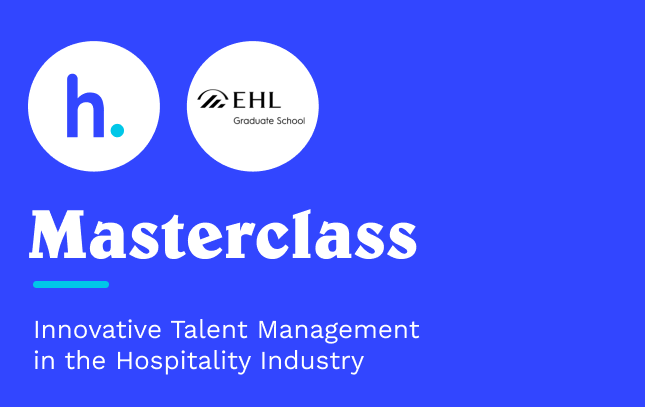
Masterclass summary: Innovative Talent Management in Hospitality
by Martha Croissy | June 28, 2023 | HR TRENDS ,EVENTS |
The hotel sector faces a pressing challenge of staff retention, exacerbated by the post-pandemic era. As employees choose not to return, the question arises: How can we navigate the coming years? Enter skills-based hiring—an enticing talent management solution to revive hospitality careers, attract fresh talent, and retain existing employees.
Hosco and EHL's Graduate School recently hosted a 1-hour online masterclass titled "Innovative Talent Management in the Hospitality Industry”, where Industry experts Dr. Bertrand Audrin and Mr. Eike Clausen shed light on this approach. Dr. Audrin, an Assistant Professor at EHL Hospitality Business School, specialises in HR Management and Organisational Behaviour research. Meanwhile, Mr. Clausen, Regional Director of Operations Europe at Kempinski Hotels, brings practical expertise.
In this article, we define innovative talent management strategies and provide key takeaways from the masterclass. Catch the webinar replay below (English only) or read on for a summary that packs a punch!
What Is Talent Management in Hospitality?
Talent management is a strategic process of acquiring the right talent, onboarding that talent and helping them fulfil their potential while simultaneously meeting your hotel’s business objectives. Talent management entails identifying existing talent gaps, open positions, sourcing talent, onboarding and growing the talent within the business. Its key objective is to develop a skilled and motivated workforce eager to stay and help your hospitality business attain its strategic goals.
Adopting a skills-based approach to talent management is becoming increasingly crucial for hotel/restaurants seeking to thrive in a competitive business landscape. By identifying core skills and values, incorporating them into selection processes, investing in employee development, and reimagining compensation, you can tap into a broader talent pool, strengthen your employer brand, and enhance staff retention.
🧐 Conducting HR audits can help you reveal compliance gaps. Find everything you need to know about HR audit and compliance for your hotel business.
7 Steps for Increasing Your Staff Retention and Talent Pools With a Skills-Based Hiring Approach
1. Identify Core Skills and Values
The first step in adopting a skills-based hiring approach is identifying core skills and values for your hospitality business. This helps target recruitment efforts and establish effective workforce planning.
When hiring, it's important to understand the practical behaviours associated with values. According to Eike, Kempinski looks for 5 core or DNA values. The company is on the hunt for the right attitude and intrinsic motivation in people.
A skills-based hiring approach requires versatility and adaptability from employees, allowing for flexible work arrangements. Dr. Bertrand suggests hiring generalists with core skills and values who can handle multiple tasks instead of hiring specialists.
2. Incorporate Skills Testing in your Selection and Development
Once the core skills and values are identified, you can incorporate them into your selection practices. “You’ll need to have selection practices to identify if candidates possess these skills or not,” states Dr. Bertrand.
3. Increase Your Talent Acquisition and Retention
“In terms of talent acquisition, a skills-based hiring approach gives you access to a bigger talent pool. Skills allow you to go beyond qualifications and experience. You look for what people are able to do, accessing an untapped talent tool. This is especially the case when it comes to non-traditional candidates; people who don't come initially from the industry but have the right skill set to work in it”, states Dr. Bertrand.
Furthermore, this approach enhances your employer brand, showcasing it as one that values its people and their skills. This, in turn, contributes to better attraction of talented individuals.
On retention, Dr. Bertrand states that a skills-based hiring approach will impact the way day-to-day work is conducted, and in that respect, the employee experience is transformed.
When people have more opportunities to stand out and make a difference, they can use their unique skills to experiment and keep learning. “It's a dynamic and empowering approach for employees, because they become in charge of their own career and skill set” he says.
4. Streamline Employee Compensation and Benefits
Adopting a skills-based hiring approach revolutionises compensation and benefits in the hotel industry. Instead of paying based on specific positions, hotels can now reward employees for their unique skill sets and abilities. Dr. Bertrand emphasises the importance of properly acknowledging and rewarding these skills.
While compensation is crucial, it's only a fraction of what motivates hotel industry professionals. “At Kempinski, we understand the need for competitive pay and benefits, but we go beyond monetary rewards. Our approach focuses on career growth, work-life balance, and fostering a supportive work environment,” shares Eike Clausen.
5. Enhance Employee Engagement
Engaged employees are vital for delivering outstanding guest experiences. Kempinski e.g., understands this importance and conducts an annual Employee Engagement survey, providing employees with the opportunity to provide anonymous feedback.
This feedback allows their business to identify areas for improvement and prioritise enhancing the employee experience. “The survey helps Kempinski uncover areas of growth and encourages employees to share their valuable insights” claims Eike.
6. Leverage Digital Technology
Digital tools streamline the assessment of skills during the hiring process, providing data-driven insights and collaborative assessments. “Digital technology facilitates skills-based approaches at every step, from improved skill assessment during selection to real-time tracking and identification of skill gaps” according to Dr. Bertrand Audrin.
Digital platforms enable real-time skills tracking, eliminating the need for outdated Excel spreadsheets. Eike Clausen highlights Kempinski's use of their employee evaluation platform, which centralises performance reviews and talent metrics. This allows the identification of high-potential employees and those who may need further development within the company.
Overall, digital technology enables a more dynamic and flexible adoption of the skills-based hiring approach.
7. Invest in Employee Training and Development
Hospitality businesses must invest in developing the skills of their employees and provide opportunities for continuous growth and learning. “You have to develop these skills, train people to keep growing their skills and keeping their skills up to date” states Dr. Bertrand.
Kempinski offers a bespoke Learning Journey to its employees, recognizing the importance of continuous skill development. “We pay a lot of attention to onboarding and orientation. There are pre-floor fundamentals which every employee should go through which are related to grooming, communication etc” states Eike.
3 Challenges of Talent Acquisition and How to Overcome Them
Changing Talent’s Perception of the Industry
Hospitality has often been associated with long hours and low pay, leading to a negative perception among potential employees. Both experts agree that improving the industry's reputation requires effective communication to showcase the broad range of opportunities that hospitality offers.
Dr. Bertrand states that, “A kind of shift is needed because again there's a lot of prejudice in the spirit of people of what working in hospitality means. There are a lot of amazing career opportunities in hospitality, but they’re not communicated enough”.
“The reputation of our industry is unfortunately worse than working in it actually is. It’s an exciting industry with a lot of opportunities, and we can do better to improve the communication about it,” says Eike.
Engaging and Retaining Young Talent
Both Eike and Bertrand asserted that attracting and retaining young talent, particularly from Generation Z is a challenge. They recognised that this generation seeks meaningful work and values passion over traditional career motivations. To cater to this mindset, companies need to assess and provide opportunities that align with the intrinsic motivation of younger employees.
By creating an environment where individuals can find fulfilment and engagement, the industry can benefit from a more committed and dedicated workforce.
Accommodating Generational Differences in Talent
During the discussion, the experts acknowledged that different generations bring unique values and perspectives to the workplace. Some individuals may prioritise rapid career advancement, while others view work as a means to pursue personal dreams.
To accommodate these differences, the experts emphasised the importance of clear communication and performance-based career planning. Rather than relying solely on age or generation, setting transparent performance goals can provide insight into who needs to be promoted to certain roles:
“We as an industry can certainly do better in outlining certain performance goals communicating this transparently. Promotion is not about seniority but performance. We must be clear about the KPIs we’d like to see from employees so they can progress in their career” claims Eike.
🤩 Hiring third-country nationals can help you fill talent gaps. Find out how to go about this strategy, including the pitfalls to avoid.
Get to Know the Experts Better

|
Dr. Bertrand Audrin Dr. Bertrand Audrin is the Assistant Professor in Human Resource Management and Organisational Behaviour at EHL Business School. His research focuses on digital transformation and its impact on organisations, human resource management, and employment relationships. His current projects tackle questions on digital skills and emotional intelligence, new ways of working and AI for recruitment. |
|
|
Mr. Eike Clausen Mr. Eike Clausen is the Regional Director of Operations Europe at Kempinski Hotels. He oversees hotel performance and operations across Europe. He has worked in multiple properties across the globe and is responsible for executing the strategic goals at the group level and ensuring that it is performing in alignment. |
MORE RELATED CONTENT
Ready to hire on Hosco? Create your company account.
Want to enhance your people strategy
and keep it up to date?
Subscribe to our blog.

.png?width=767&name=GUIDE-%20ENG-BANNER%20(1).png)




